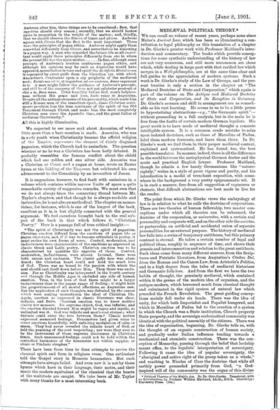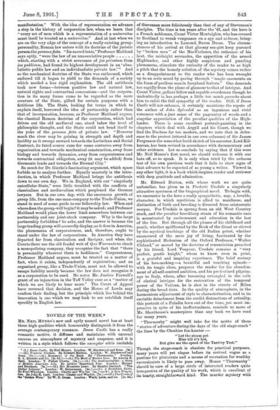3fEDLEVAL POLITICAL THEORY.* WE can recall no volume of recent
years, perhaps none since Maine's Ancient Law, which has been so illuminating a con- tribution to legal philosophy as this translation of a chapter in Dr. Gierke's greater work with Professor Maitland's intro- duction and commentary. The books which provide concep- tions for some synthetic understanding of the history of law are not very numerous, and still more uncommon are those which, while dealing in large part with that rarified law which merges in a Well-philosophic, are at the same time clear and full guides to the appreciation of modern systems. Such a work is Dr. Gierke's study of the Law of Groups, and the pre- sent treatise is only a section in the chapter on "The Medi.seval Doctrine of State and Corporation," which again is part of the volume on The Antique and 3fediwval Doctrine of State and Corporation, and its Beception in. Germany. Dr. Gierke's acumen and skill in arrangement are as remark- able as his vast learning. He seems to us to be a little prone to hypostatising abstractions—e.g., "the Germanic spirit "— without proceeding to a full analysis, but in the main he is free from the faults of certain modern German legalists. His
great merit is to have made of medimval thought a concrete
intelligible system. It is a common crude mistake to seize upon isolated doctrines, such as those of Marsilius of Padua, label them modern forecasts, and leave them there. In Dr, Gierke's work we find them in their proper medimval context, explained and systematised. He has found, too, the best possible translator. In manner, indeed, there is all the difference in the world between the metaphysical German doctor and the acute and practical English lawyer. Professor Maitland, though he admits a few handy Germanisms like " nature- rightly," writes in a style of great vigour and purity, and his introduction is a model of trenchant exposition, with some- where in the background a very pretty epigrammatic wit. It is in such a manner, free from all suggestion of vagueness or rhetoric, that difficult abstractions are best made to live for the reader.
The point from which Dr. Gierke views the embryology of
law is in relation to what he calls the doctrine of corporations. There are two theories of human fellowship, two master con- ceptions under which all theories can be subsumed, the doctrine of the corporation, or universitas, with a certain real personality and corporate will, and on the other side the societas, or partnership, an artificial and accidental union of separate personalities for an external purpose. The history of medimval law falls into a series of temporary antitheses, but this primary contrast is eternal. He takes a certain number of legal and political ideas, roughly in sequence of time, and shows their genesis and interconnection and relation to the great antithesis. Such ideas come from many different sources, from the Scrip- tures and Patristic literature, from Augustine's Civitas Dei, from the Roman and the Canon Law, from Aristotle's Politics, and in a high degree from the tales of mediceval historians and Germanic folk-lore. And from the first we have the two habits of thought, the genuinely medimval, which contained within it the germs of the modern idea of organism, and the antique-modern, which borrowed much from classical thought and culminated in the rigid system of natural law which preceded the French Revolution. The great guiding concep- tions mainly fall under six heads. There was the idea of unity, for which both Imperialist and Papalist hungered, and which in Marsilius of Padua led to the creation of a system
in which the Church was a State institution, Church property State property, and the sovereign ecclesiastical community was identical with the political assembly of the citizens. There was the idea of organisation, beginning, Dr. Gierke tells us, with the thought of an organic construction of human society, and gradually under Italian influence tending towards a mechanical and atomistic construction. There was the con- ception of Monarchy, passing through the belief that lordship meant office, to the legalists' interpretation of sovereignty. Following it came the idea of popular sovereignty, the "aboriginal and active right of the group taken as a. whole," and reaching in Nicolas of Cues the doctrine that while all earthly power proceeded primarily from God, "a God- inspired will of the community was the organ of this divine
• Political Theories of the Middle Age. By Dr. Otto Gierke. Translated, with an Introduction. by Frederic William Maitland, LL.D., D.O.L. Cambril ■re 'University Press. [108,1
manifestation." With the idea of representation we advance a step in the history of corporation law, when we learn that "every set of men which is a representation of a universitas must itself be treated as a universitas." And at last when we are on the very edge of the concept of a really existing group. personality, Roman law enters with its doctrine of the juristic person,the personafecta. "Its sacred texts," Professor Maitland says aptly, "were the law of an unassociative people which, starting with a strict severance of jus iorivatum from jus publicum, had found its highest development in an abso- lutistic public law and an individualistic private law?" And so the mechanical doctrine of the State was enthroned, which endured till it began to yield to the demands of a society which needed a less rigid explanation. The old antithesis took new forms—between positive law and natural law, natural rights and contractual concessions—and the corpora- tion in its many forms came to be regarded as the mere creature of the State, gifted for certain purposes with a fictitious life. The State, looking for terms in which to explain itself, borrowed the idea of partnership rather than that of incorporation, because, as Professor Maitland argues, the classical Roman doctrine of the corporation, which had driven out the old media3val one, stood below the level of philosophic thought, and the State could not bend itself to the yoke of the persona ficta of private law. "However much the river may be gaining in strength and depth and lucidity as it sweeps onward towards the Leviathan and Social Contract, its fated course runs for some centuries away from organisation and towards mechanical construction, away from biology and towards dynamics, away from corporateness and towards contractual obligation, away (it may be added) from Germanic lands and towards the Eternal City."
So much for Dr. Gierke's fascinating argument, which space forbids us to analyse further. Equally masterly is the intro- duction, in which Professor Maitland brings the antithesis down to our own day. We in England, with our "singularly unicellular State," were little troubled with the confficts of classicalism and medirevalisni which perplexed the German lawyers. But in our own day, with the enormous growth of group life, from the one-man-company to the Trade-Union, we stand in need of some guide to our fellowship law. When and where does the group-will begin? it may be asked; and Professor Maitland would place the lower limit somewhere between our partnership and our joint-stock company. Why is the large partnership forbidden ? he asks, and the answer is because the large trading group will assuredly display, as it does in America, the phenomena of corporateness, and, therefore, ought to stand under the law of corporations. In America they have departed far from classicalism and Savigny, and when the Courts there use the old feudal writ of Quo Warrant° to check a monopolising company, they recognise the fact that "there is personality wherever there is bodiliness." Corporateness, Professor Maitland argues, must be treated as a matter of fact, when it exists, independently of registration; and an organised group, like a Trade-Union, must not be allowed to escape liability merely because the law does not recognise it as a corporation to be sued. He notes Mr. Justice Farwell's grant of an injunction in the Taff Valley case as a "matter of which we are likely to hear more." The Court of Appeal have reversed that decision, and the House of Lords may confirm their finding, but the principle which lies behind the innovation is one which we may look to see establish itself speedily in English law.







































 Previous page
Previous page